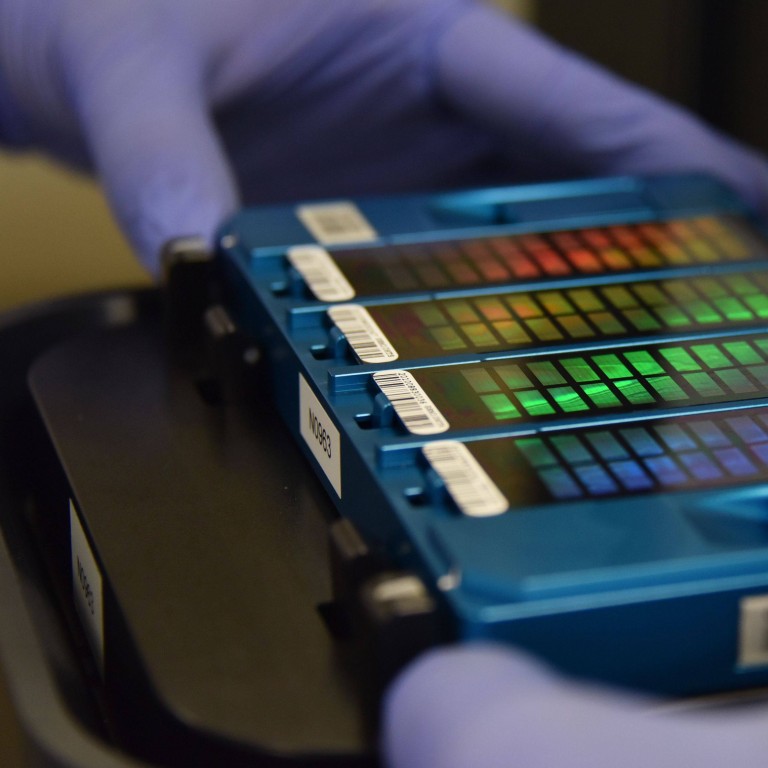
China’s top spy agency warns of ‘gene weapons’ able to target specific ethnicity or race
- Some nations targeting Chinese population for ‘ulterior motives’, Ministry of State Security says on official WeChat account without offering details
- While some call it ‘science fiction’, advanced DNA sequencing, genetic data and AI may make ‘ethnic bioweapons’ a reality, researchers say
Some countries have “armed” themselves with deadly weapons targeting human genes, China’s top spy agency alleged on Monday – the first time a Chinese state body has mentioned such a threat publicly.
In a post on its official WeChat account, the Ministry of State Security said some nations had targeted the Chinese population for “ulterior motives”.
The ministry did not name those countries or offer evidence to support the claim.
In a report in February last year, researchers from the Council on Strategic Risks said the threat of bioweapons as a deterrent was “irrelevant” because no country was safe from the effects of a pandemic.
But what the Chinese ministry is alleging countries have made is not a biological agent engineered for the entire world but rather the creation of a targeted threat, or genetic weapons.
Genetic weapons, also known as ethnic bio-weapons, are genetically engineered biological weapons that are capable of targeting members of a specific race or ethnicity.
While up to 99.9 per cent of human DNA is shared between all individuals on earth, there are key genetic differences that distinguish those of a certain ethnicity or race, the Chinese ministry said.
According to the ministry, these differences can be utilised to “kill targets of a predetermined race”.
The Chinese ministry is not the first to allege the existence of genetically targeted bioweapons.
In June, US presidential candidate Robert F Kennedy Jnr claimed that “the Chinese are developing ethnic bioweapons”, further stating that the US has also been developing such technology.
“It is highly unlikely that a weapon that targets certain ethnic groups could be developed,” Richard Parsons, a senior lecturer in Biochemical Toxicology at King’s College London, told the Science Media Centre in response to Russia’s claims.
Parsons said that while there are currently pharmaceutical agents that are more effective in certain ethnic groups, these take a long time to develop and “even members of the same ethnic group don’t share all these differences”.
Oliver Jones, head of Biosciences and Food Technology at RMIT University, told the Science Media Centre that the claim “belongs purely in the realm of science fiction”.
Jones told the Post via email that humans are so genetically similar that a weapon targeting one group was likely to harm the perpetrator as well.
“As far as I know nobody has actually shown a plausible, or even only theoretically plausible, way this could be done,” he said.
The concept of genetically engineered biological agents came to the public attention at the start of the Covid-19 pandemic, when some scientists hypothesised that the virus causing the disease did not look to be of natural origin.
In January 2020, Kristian Andersen, director of Infectious Disease Genomics at the Scripps Research Institute, stated in an email that he and other scientists found the genome of the virus to be “inconsistent with expectations from evolutionary theory”.
Less than two months later, a letter published in the journal Nature citing Andersen as the lead author said further examination had shown the virus was “not a laboratory construct or a purposefully manipulated virus”.
Concerns over the potential threat of genetic bioweapons are not new. In 1999, a report by the British Medical Association warned that the creation of such weapons would be feasible in the near future.
A report by the James Martin Centre for Nonproliferation Studies in 2021 stated that a weapon system designed to “optimise effect on particular groups based on genetic profiling” was possible, but faced several technical challenges.
One of those is the selection of genetic markers. The more specific a marker is, the less likely it is to be frequent enough in all members of an ethnicity or race to target it as a whole.
If the weapon chooses to target a frequent marker instead, this is more likely to exist in nearby ethnic groups and populations and therefore cross over into unintended targets, according to the report.
Another challenge is that the effects and targets of a weapon observed in the lab may not translate into the real world, which could mean the weapon either spreads in an uncontrolled manner, or could just not work at all.
But the James Martin Centre report warns that advancements in DNA sequencing, artificial intelligence and collection of genetic data sets could “enable identification of increasingly precise targets for a genetic weapon system”.
The Biological Weapons Convention, which China, Russia and the United States are signatories to, is a global safeguard aimed at prohibiting the development and use of such weapons.
According to a 2021 report by the Global Challenges Foundation, while states under the convention are expected to destroy any such weapons created, the lack of an agreed upon definition for a biological weapon means countries can take advantage of the loopholes to still be researching them while complying with the treaty.
Jones pointed out that what can be defined as a weapon could vary widely, as it could be a modified pathogen or a harmful organism, among other things. No matter the definition, he said the use of such a weapon would be “attempted genocide”.
“Genetic weapons are more concealable, deceptive, easy to spread and harmful in the long term,” the Chinese ministry said in their post. “Once used in war, the consequences will be devastating.”
“It is hard to know why multiple government bodies and affiliated individuals have made claims of such genetically targeted weapons given they do not exist,” Jones said, adding that he suspects politicians making such claims do not “really understand the science of this”.

